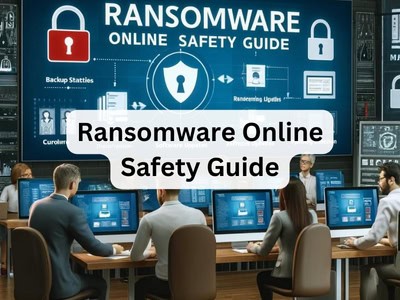This post is also available in:
![]() 简体中文 (Chinese (Simplified))
简体中文 (Chinese (Simplified))
Ransomware – A Guide to Keeping Yourself Safe Online
Keeping You, Your Business Safe and Your Personal Data Safe Online
 The internet has brought many benefits, but also many threats in its wake. One such example is the threat of ransomware.
The internet has brought many benefits, but also many threats in its wake. One such example is the threat of ransomware.
It remains the prevailing threat that many individuals and businesses must contend with. The only way to overcome this threat is by arming yourself with the information and safety measures needed. Protecting your data and that of your business should be the utmost importance. Especially where sensitive data related to clients is concerned.
Understanding Ransomware
An unwanted malware in your system, ransomware is the last thing you want to turn on your computer or mobile phone to find. When attacked by it, your computer, mobile and any other digital device will be locked until the requested ransom has been paid. Some forms of this malware work by encrypting all the files you store on any shared drives or network. Without paying the ransom, your files are rendered useless and unusable, leaving you with no choice but to pay to obtain the decryption you need.
Once attacked, you would usually receive a “ransom note” that contains the details that must be paid. This is one way cyber criminals underhandedly spread panic and fear in their victims. They threaten to hold on to your information or destroy it unless you pay what they ask.
These cyber criminals spread the malware through phishing or emails that contain malicious links or attachments. One the suspecting user opens the attachment, the criminals get to work. The danger is that this infectious content can sometimes be found on legitimate websites too, if the advertisements on the site have been compromised.
What to Do If You’ve Been Attacked
Anyone can be a victim of ransomware. Both individuals and businesses are not safe from the threat. For now, it’s difficult to recover data that has been encrypted by the malware. Not impossible, but very difficult. Therefore, preventative measures are necessary to protect yourself and the data that is stored online.
Among the preventative measures you can take include:
- Backing up your content and files regularly
- Updating your window and software as often as possible
- Encrypting any sensitive data you have
- Installing ad or script blockers or extensions
- Install spam filter on your email
- Disable Microsoft Office macros until you need to use it.
- Use an application control software
- Disabling any unnecessary services you no longer need
In the event one of your devices becomes infected, here’s what you need to do:
- Isolate the infected device by immediately disconnecting it from your network.
- Conduct regular scans of your computer using anti-malware applications.
- Have backup sources you can perform regular data restoration on.



